Vacuum tubes
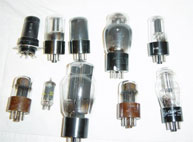 The very first electronic computers used vacuum tubes as switches.
The very first electronic computers used vacuum tubes as switches.
- Vacuum Tubes were the very first switches used by the electronic computers and they had disadvantages.
- They occupied with large room spaces.
- They consumed huge amounts of electrical power.
- They generated a massive amount of heat.
- Because of these reasons the tube failed frequently.
Transistor
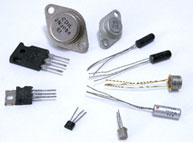 The invention of the transistor replaces the tubes and made a revolution of computers.
The invention of the transistor replaces the tubes and made a revolution of computers.
- Transistor was much more efficient as a switch when compared with tubes.
- They were much faster than tubes.
- The greatly reducing the size of computers used today.
- They were much more reliable when compared to the vacuum tubes.
- Computing as we know it today would not be possible without the invention of transistors.
Integrated Circuits (ICs)
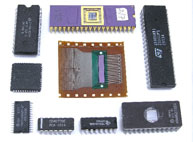 Integrated circuits which contains millions of transistors in a small pack that made computers to fit on to a palm of a person
Integrated circuits which contains millions of transistors in a small pack that made computers to fit on to a palm of a person
- It is very very small in size and consumes a little amount of electrical power even from batteries.
- In June 2001, Intel invented the world’s smallest transistor that allows millions of transistors to be packed in a very small unit.
- In 2003 AMD Athlon 64 processor with 105.9 million transistors
- Pentium 4 Extreme Edition with 178 million transistors, were introduced
LSIC - Large Scale Integrated Circuits
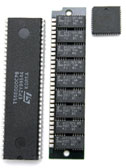 Further development, driven by the same economic factors, led to "Large-Scale Integration" (LSI) in the mid 1970s, with tens of thousands of transistors per chip.
Further development, driven by the same economic factors, led to "Large-Scale Integration" (LSI) in the mid 1970s, with tens of thousands of transistors per chip.Integrated circuits such as 1K-bit RAMs, calculator chips, and the first microprocessors, that began to be manufactured in moderate quantities in the early 1970s, had under 4000 transistors. True LSI circuits, approaching 10000 transistors, began to be produced around 1974, for computer main memories and second-generation microprocessors.
VLSIC - Very Large Scale Integrated Circuits
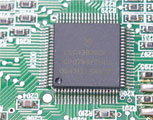 The final step in the development process, starting in the 1980s and continuing through the present, was "Very Large-Scale Integration" (VLSI). This could be said to start with hundreds of thousands of transistors in the early 1980s, and continues beyond several hundred million transistors as of 2007.
The final step in the development process, starting in the 1980s and continuing through the present, was "Very Large-Scale Integration" (VLSI). This could be said to start with hundreds of thousands of transistors in the early 1980s, and continues beyond several hundred million transistors as of 2007.GENERATIONS OF COMPUTERS | ||||
| FIRST (early 50's) | SECOND (late 50's) | THIRD (60's) | FOURTH (70's +) | |
Technology | vacuum tubes | Transistors | IC | Microchips (LSI, VLSI) |
Relative speed | 1 | 100 | 100 | 1,000,000 +++ |
Relative cost | 1 | 0.1 | 0.01 | 0.001 --- |
RAM capacity (bytes) | 1,000-8,000 | 4,000-64,000 | 32,000- 4,000,000 | 32,000,000+++ |
External storage | cards | Tape | magnetic disks | mass storage |
Operating System | Single user; jobs scheduled manually | Single user; jobs scheduled automatically | Multiple users; time- sharing | Multiple users; distributed systems |
 ශිල්ප 64
ශිල්ප 64